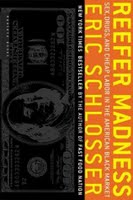Reefer Madness Sex, Drugs, and Cheap Labor in the American Black Market by Eric Schlosser
 Reefer Madness Sex, Drugs, and Cheap Labor in the American Black Market
Reefer Madness Sex, Drugs, and Cheap Labor in the American Black Marketby Eric Schlosser
Read by the author
Produced by Simon & Schuster Audio 2003
Okay one more non-fiction book and then I'll get back to some more fiction. I picked up this audio book because I read the author's book on the meat and fast food industry, "Fast Food Nation." For a while after reading that book I would not touch fast food mainly because of the gross out factor caused by Eric Schlosser's expose' of the unsafe practices in those industries. Schlosser also exposed the greed and the lack of concern for the consumer's of those same products and the employees of the companies involved. The one thing that Schlosser excelled in was in following the money.
This book is no exception, in fact that's pretty much the gist of the book, following the money. "Reefer Madness" is a look at the three pillars of the underground economy of the U.S., estimated to be ten percent of American GDP: marijuana, migrant labor, and pornography.
In Reefer Madness, the first section of the book Schlosser argues, based on usage, historical context, and consequences, for the decriminalization of marijuana. This section revolves around Mark Young of Indiana, who was sentenced to life in prison without parole for his relatively minor role in a marijuana deal. This is one of the examples of marijuana laws being unreal, where in many states marijuana possession can get harsher penalties than committing murder.
In the Strawberry Fields, he explores the exploitation of illegal immigrants as cheap labor, arguing that there should be better living arrangements and humane treatment of the illegal immigrants America is exploiting in the fields of California. This segment seems like either an epilogue or prologue to this previous book "Fast Food Nation." In fast food nation the migrant workers/illegal immigrants are used in meat packing in extremely unsafe conditions and with very little pay. In this segment of the book those workers are trying to squeak by on very little money doing jobs no one wants to do. In one conversation the farm owner says every once in a while some college kids come looking for work but the work is so difficult they don't last half a day.
One thing I always found curious was; Why don't the farmers that employ illegals use machinery to do the harvesting and get rid of the problem of illegals sneaking across borders to do back breaking work? Schlosser explains this, and I'm summing up the explanation here, by saying for farms to do the work with the machinery an initial purchase of said machinery would cost into the millions and right now they only spend thousands paying the migrant workers, also that we Americans like for our fruit and vegetables to not be blemished and the workers can pick with care unlike the machines.
An Empire of the Obscene details the history of pornography in American culture, starting with the eventual business magnate Reuben Sturman, an enigmatic Ohio man who started out selling discarded comic books from the back of his car goes on to buil and control a formidable pornography empire. After beating a string of obscenity charges the government finally catches Sturman in the only way possible, tax evasion. Finally the government can put Sturman behind bars. But after all the court cases against Sturman bringing down religion based obscenity laws the business of pornography becomes a major business now backed by many Fortune 500 companies.
Schlosser unravels an American society that has "become alienated and at odds with itself." Like "Fast Food Nation", this is an eye-opening book with Schlosser doing some serious investigative leg work. Schlosser doesn't really come out in support of the Porn Industry or the legalization of drugs but does point out the hypocrisy that gives a marijuana user life and a murderer 10 years as sentencing and jailing obscenity while major corporations fund it, while that same America promotes indentured servitude (slavery) for the illegal immigrants. "..the price of freedom is often what freedom brings."
Schlosser closes by arguing that such a widespread black market can only undermine the law and is indicative of the discrepancy between accepted mainstream American culture and its true nature.
Labels: audio book, book review, books, eric schlosser, illegal, illegal immigrants, marijuana, non-fiction, pornography, reefer madness
posted by Gil T. @ 10:14 PM Comments: 0





























